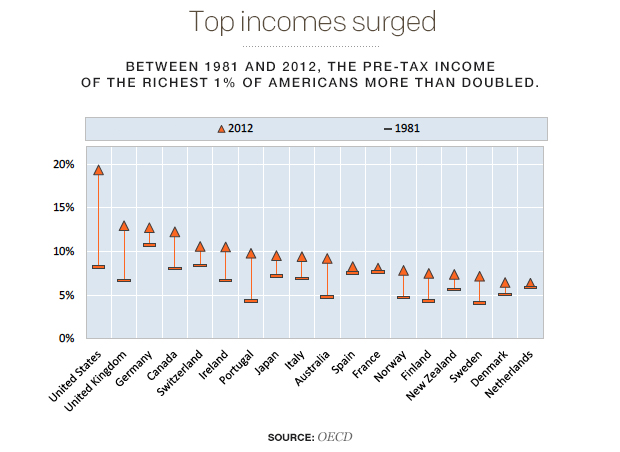Richest Americans see huge growth in income
Here's a startling fact that illustrates how income inequality is changing the U.S.: The top 1 percent of Americans now take home 20 percent of all pre-tax income in the country, or more than double their share in 1980.
The findings, from a report out this week from the Paris-based Organisation for Economic Co-operation and Development, illustrate the diverging economic fortunes of the top 1 percent of households in America and everybody else, whose earnings have failed to keep pace during the same time period.
The level of income inequality in the U.S. is now much worse than that in other countries, although the rich in countries ranging from Canada to Denmark have also increased their share of the income pie. The rise of the 1 percent was "most spectacular in the U.S," the report states.
While the rich saw large income gains in the U.S. between 1980 and 2010, the super-rich have done even better: Total pre-tax income for the top 0.1 percent of earner more than quadrupled over that period, to over 8 percent, according to the OECD.
Average U.S. income grew at a rate of about 1 percent from the mid-1970s through the late 2000s. But, the study points out, after stripping out the enormous gains of the country's top earners, 99 percent of Americans saw their incomes rise by an annual growth rate of only 0.6 percent.
"The disproportionate surge in top incomes also helps explain why so many people have not felt their incomes rising in line with national GDP growth," the study notes.
So what's driving America's worsening inequality?
Taxation policies may be to blame, given the reduction in both progressive income and inheritance taxes since the 1970s. The study also notes theories such as the "superstars" idea -- that top employees are rewarded more than run-of-the-mill workers -- although that idea is less persuasive as the main cause given that not all countries witnessed the same level of income disparity.
"While top tax rates were equal to or above 70 percent in half of the OECD countries in the mid-1970s, this rate had been halved in many countries by the end-2000s," the study found. That's led to higher disposable income, which allows the rich to "to save and accumulate capital which eventually increases incomes further."
The findings come amid a widespread public attention on French economist Thomas Piketty and his best-selling economics tome, "Capital in the Twenty-First Century." The book, which has earned positive reviews from the likes of Nobel Prize-winning economist Paul Krugman, analyzes centuries of data on wealth and economic growth.
Piketty's point is that the rate of return on capital has historically outpaced the rate of economic growth. With growing income inequality, the richest 1 percent are able to capture a growing share of a nation's wealth and income.
The OECD, a group encompassing 34 of the world's largest economies, notes that its analysis (which uses data developed by Piketty) is aimed at finding policy solutions to ensure a more equal distribution of resources.
The group's recommendations? Raising taxes on the rich by reducing tax deductions that benefit top earners and taxing all compensation, including capital gains, as ordinary income.
Piketty's book has set off a vigorous debate about economic inequality, and some dissenting voices have questioned the validity of his findings, which are based on an analysis of tax and estate records going back more than a century.
Leonid Bershidsky at Bloomberg View argues that Piketty's data fails to include government transfers, such as Social Security or food stamps. Before taking on policy changes, he notes, data on these government redistributions should be analyzed.
On the left, some have questioned Piketty's theoretical framework, accusing him of misinterpreting history and soft-pedaling problems that critics say are inherent to capitalism.
